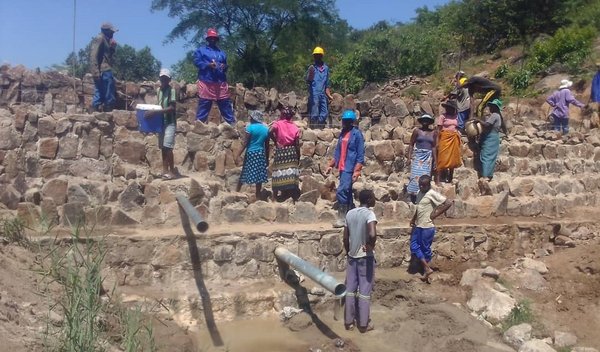- Share this article
- Subscribe to our newsletter
Harvesting water to minimise the effects of climate change in rural Zimbabwe
Because of climate change, water scarcity in Zimbabwe has become an everyday problem in both urban and rural areas. This could become even worse in the coming months, as even lower rainfall is predicted for Zimbabwe due to the El Niño conditions expected in southern Africa.
One affected area is Mubagwashe in Masvingo Rural District. But with the SEFF project, water scarcity challenges in the area will soon be a thing of the past thanks to water harvesting methods such as the construction of a weir dam.
For some time, people in Mubagwashe have not had enough water for agricultural and household use. Nearby waterpoints for livestock and gardening dry up soon after the rainy season, forcing villagers to walk more than 5km to the nearest water source. A number of families within the community have been left exposed and are unable to have small backyard gardens for private consumption. Young boys and girls in the community do not have enough time for social activities or rest as they must walk long distances to access water. This is where the SEFF project steps in. The initiative aims to improve living conditions for the people in Mubagwashe by building a weir dam, among other things.
The dam will help in different ways
“The dam will help us transform our lives,” explains Pearson Chinuwe, the community chairperson for the weir dam construction in Mubagwashe. “In the past we have struggled to get water and as a result, we walk long distances to access water for our cattle. When the dam is complete, we will also be able to venture into fish farming and support our families.”
The dam will also help them to improve their quality of life by embarking on other income-generating activities. The community is assisting in the construction of the weir dam, and everyone living within a 10km radius is set to benefit. When construction is complete, the dam will be handed over to the government.
Through the SEFF project, Terre des Hommes Italy is creating a community garden with an irrigation system and water storage tanks 100 metres away from the weir dam. It is one of three suchgardens established by the project and is an effective strategy for coping with climate shocks and improving livelihoods in drought-prone districts such as Masvingo Rural District. A total of 60 community members have been selected to benefit from the community garden.
“Through this garden, we are hopeful that we will be able to raise money for the upkeep of our families,” says Patrick Chimasha, one of the local beneficiaries. “We will be able to pay school fees for our children. The garden will improve our lives and our community. In the future, we want to plant tomatoes, vegetables, sweet potatoes, and potatoes to supply big markets in Harare.”
The three-year SEFF project is not only active in Masvingo rural district, but also in Chiredzi and Mwenezi districts. At least 6,000 people are expected to benefit from the project, which also aims to improve traditional farmer seed systems in terms of selection, storage, multiplication and utilisation. The project has 3.7 million euros in funding and is now in its second year. Dams and micro-irrigation systems are also being set up in other communities to provide food and income for households and schools. In addition, improvements will be made to high-quality crop production and selected irrigation systems, with a particular focus on the value chain of various crops and the promotion of gender equality and innovative management models with the private sector.
The project is funded by the Italian Agency for Development Cooperation (AICS) and implemented by Terre des Hommes Italy in Zimbabwe together with Co-operation for the Development of Emerging Countries – COSPE (lead partner), Sustainable Agriculture Technology (SAT), Community Technology Development Organisation (CTDO), Women and Land in Zimbabwe (WLZ) and Rete Semi Rurali.
Tanaka Aggrey Chitsa focuses on development and humanitarian work and is an advocacy, communications and policy specialist based in Harare, Zimbabwe. Contact: tanaka.aggrey@gmail.com





Add a comment
Be the First to Comment